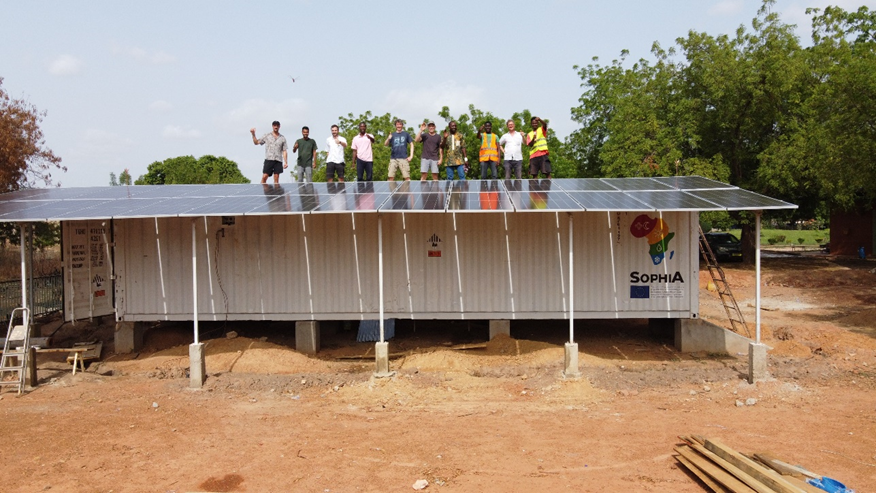About the project
The SophiA project (Sustainable Off-grid Solutions for Pharmacies and Hospitals in Africa) aims to improve healthcare in Africa by addressing unreliable energy and water supply in remote regions. It delivers sustainable, solar-powered systems to provide uninterrupted electricity, clean water, hot water, and refrigeration for vaccines and medicines. Focusing on hospitals in Burkina Faso, Cameroon, Malawi, and Uganda, SophiA enhances healthcare delivery and infrastructure while promoting environmentally friendly solutions aligned with sustainable development goals.
Description of success
In 2024, SophiA achieved a significant milestone with the installation of its first renewable energy system at the Dr. Sedogo Medical and Surgical Clinic in Léo, Burkina Faso. After two and half years of development, testing, waiting for components, shipping, and customs, the system was installed over two months in 2024. Following this, the system was commissioned in just two weeks, showcasing the dedication and expertise of the project team.

Figure 1: The SophiA system and the installation team
The system integrates solar energy, water purification, and refrigeration technologies to meet the essential needs of the clinic and surrounding community. It ensures continuous power supply, safe drinking water, and proper storage of temperature-sensitive vaccines and medicines. The system can also produce steam, providing an emission-free cooking solution. The different technologies are held in one single container, saving space and improving efficiency. The installation was celebrated at an inauguration ceremony attended by local dignitaries and stakeholders, including the High Commissioner of the Sissili Province.

Figure 2: Cooking with solar energy
In addition to the installation, the project conducted capacity building through hands-on training for 28 local technicians and engineers, equipping them with the skills needed to operate and maintain the system. This training ensures the system’s sustainability by empowering the local workforce with valuable expertise in clean energy solutions.

Figure 3: Training certificate awarded to participants of the course
Highlights
Installation of the first SophiA system in Burkina Faso, which was then fully commissioned within two weeks.s.
Provision of continuous power, clean water, steam, and refrigerated storage for medication and vaccines.
Integration of advanced technology using solar power and natural refrigerants with a low global warming potential.
Comprehensive training for 28 local technicians and engineers in system maintenance and operation.
- Recognised with a prestigious award for advancing sustainable healthcare solutions in Africa, the ECREEE (the ECOWAS (Economic Community of West African States) Centre for Renewable Energy and Energy Efficiency) Award.

Figure 4: Attending the prestigious ECREEE awards, where SophiA's work was recognised with an award.
Outputs
A fully operational sustainable energy, refrigeration and water treatment system now supports the Dr. Sedogo Medical and Surgical Clinic in Léo.
Local technicians have been trained with specialised knowledge in solar cooling and water treatment maintenance to empower the local workforce.
The SophiA system has a significantly reduced carbon footprint compared to traditional off-grid solutions as per preliminary results.
Insights from the project were shared at international forums, inspiring further innovation and collaboration.
On-site commissioning and subsequent training sessions allowed the team to refine the system’s operational protocols and gather feedback for improvement in a validated approach to system operation.
Impact
The SophiA project has received substantial interest from healthcare professionals, policymakers, and local communities as an innovative solution for addressing energy, cooling and water challenges in rural healthcare settings. Its integration of solar energy, water purification, and refrigeration technologies provides essential resources to improve healthcare delivery and patient outcomes. This transformative approach is helping to bridge the gap between sustainable energy access and essential healthcare services.
After the project concludes, the ownership of the technologies will be transferred to the local stakeholders, who, along with the consortium partners, are exploring possible pathways to ensure its sustainability in the medium and long term.
Lessons
- It is important to simplify system designs to focus on core hospital needs, reducing costs and complexity.
- Combine multiple technologies into one single container to save space, improve efficiency, and cut production time and reduce transport logistics.
- Anticipate delays in shipping and procurement by building flexible timelines and contingency plans. For easier logistics, ship containers first to larger cities then arrange transport to smaller towns.
- Use local expertise during planning and commissioning to address context-specific challenges. Gather and integrate real-world feedback from users to refine subsequent system generations.
- Obtain necessary permits and certifications well in advance to avoid delays at ports or customs.
Other information
Find out more about the Dr. Sedogo Medical and Surgical Clinic on its website.
View the SophiA YouTube channel for videos (in French language) on the Burkina Faso initiative and SophiA system.

